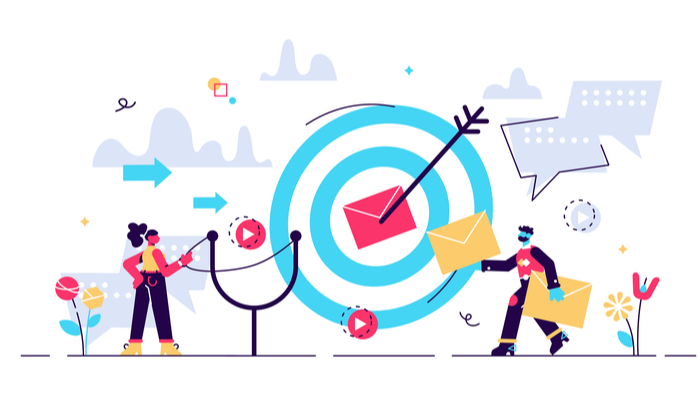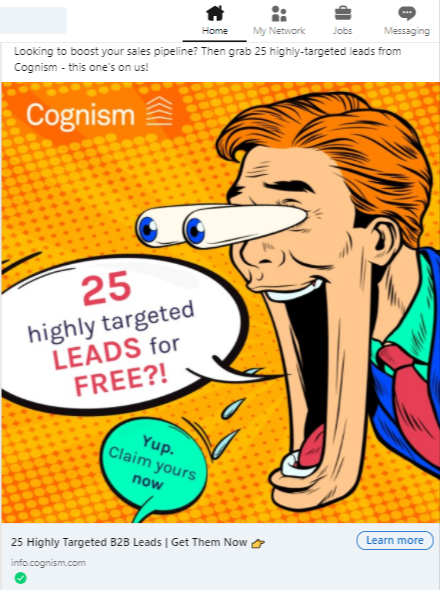
With the competition for customers becoming stiffer by the day, brands have to be savvy about the way they do their marketing.
You must employ marketing strategies that work.
One such marketing strategy is direct response marketing.
Unlike other marketing strategies that focus on building relationships with prospects first, direct response marketing seeks to turn prospects into customers in one step.
What is Direct Response Marketing?
Direct response marketing is any marketing technique designed to elicit an immediate response from your target audience. The required action can be anything from reading a blog post to downloading a resource or making a purchase.
It focuses on making things happen as soon as the prospect digests your marketing material.
For it to be effective, your direct response marketing campaign must cleverly package your value proposition, pitch, and call-to-action (CTA) in one place. This strategy results in the prospect moving quickly from your buyer journey’s consideration stage to the decision stage.
While most people associate direct response marketing with direct mail, that is only one part of it. This strategy can also include:
- landing pages
- social media ads
- paid ads
- TV/radio commercials
In a nutshell, it’s any type of marketing that requires an immediate response with the primary goal of getting a return on your investment as soon as possible.
Advantages of Direct Response Marketing
Direct response marketing has many advantages, including:
- Trackable: One of the most significant advantages of direct response marketing is that it’s easy to track and analyze performance.
- Measurable: Breaking it down by return on investment (ROI), it’s easy to measure how much you spend to reach each customer. You can also easily measure the success of the campaign.
- Targeted: Direct response marketing is fueled by data, making the campaigns more targeted. The result is higher conversion rates.
Of course, the most significant advantage is the speed with which direct response marketing produces results. This and other benefits make it a marketing strategy you should employ as much as possible.
4 Key Components of Direct Response Marketing
Every direct response marketing campaign has common elements that ensure its effectiveness in reaching your marketing goals. Here are the key components:
1. A Personalized Offer
The key to an effective direct response marketing campaign is to know your target audience. You must know their pain points and aspirations to create an offer that’s personalized. Research indicates that 80 percent of customers are more likely to do business with a brand that offers personalized experiences.
2. Clear and Compelling Content
For a campaign to be effective, you must craft content that’s:
- Clear: Use simple, everyday language so anyone who reads it can understand what you’re selling (especially the benefits) and what action you want them to take.
- Compelling: Direct response is all about getting customers to react immediately. Use active voice and power words to make your message elicit the desired reaction.
Invest in good writers as your campaign’s success hinges on your copy.
3. A Sense of Urgency
A critical component that helps drive conversions is a sense of urgency. Human beings have a natural tendency to procrastinate, especially when spending money is involved.
Creating a sense of urgency encourages quick interactions and decision-making. As a result, your campaign will have higher conversion rates.
4. An Irresistible CTA
Another important component of effective direct response marketing is the CTA. Your CTA must be:
- clear and easy to understand
- focus on one action
- easily accessible
- personalized
With these ingredients, your CTA will succeed in achieving its purpose of evoking the action you want your customers to take.
10 Examples of Excellent Direct Response Marketing
Now you know what direct response marketing is, its advantages, and the key components that make it work. Let’s go a step further and look at ten examples.
1. Referral Program
One of the most powerful forms of marketing is word of mouth marketing (WOMM). Studies show that 83% of people trust recommendations they get from family, friends, or colleagues.
That’s why one of the best examples of effective direct response marketing is a referral program.
A typical example would be running a campaign where you ask your current customers to refer your brand or product to their family and friends. You could do this by:
- sending them an email inviting them to participate in your referral program.
- asking them for referrals on your “thank you” page after they’ve purchased your product.
However you decide to do it, make it easy for them to refer a friend by furnishing them with a link to a specific page you want their friends to visit.
Additionally, incentivize your customers to participate by offering them a gift, discount, or any other perk that suits your business model.
This is direct response marketing because you’re asking your customers to take immediate action on your offer. Here’s an example from MeUndies in the form of an email they send to customers after they’ve received their purchase:

Executed well, this type of referral marketing is a great way to drive both sales and brand awareness at the same time.
2. Upselling
Upselling is the act of encouraging a customer to buy a more expensive version of a product they have or are in the process of buying. It’s a powerful technique for driving sales as it’s easier to sell to an existing customer than to a new prospect.
How can you implement direct response marketing to upsell your customers?.
Before a customer completes the buying process on your website, you can send a message asking them if they would rather have the more superior version of the product or service they’re buying.
Make sure to clearly spell out the benefits of upgrading and make it easy to switch to the new product.
3. Social Media Ads
With approximately 4 billion users globally, social media has become one of the most powerful marketing platforms to deploy direct response marketing campaigns.
Whether you’re selling a physical or digital product, a service, or promoting a lead magnet, you can use social media to get your prospects to act quickly on your offer.

To do that, make sure your ad:
- uses high-quality and relevant visuals
- has short, punchy copy
- has a clear CTA
Design your visuals to grab attention, and your copy will do the heavy lifting of pitching your offer.
4. Contests or Giveaways
Everyone loves contests.
They are full of excitement with the prospect of getting something for free.
For marketers, contests and giveaways are terrific for grabbing attention and generating buzz.
Yet, the biggest advantage of giveaways is that they are good at obtaining an immediate response from your target audience, which is precisely why they make for good and effective direct response marketing.
You’ll have to be careful with the gifts or rewards you offer, though. Make sure they align with your brand. Doing so ensures that only your target audience will respond to your campaign.
5. Text Messaging
Research shows that 77 percent of consumers say they use texting more than other forms of communicating. Add to that the fact that people regularly check their text messages, and you’ve got the perfect channel for your direct response marketing.
To leverage text messaging in direct response marketing, your target audience must sign up to receive marketing communication from you. As with email marketing, you must segment your contact list to ensure your campaigns are personalized and targeted.
Text messaging is a great way to alert your customers about exclusive deals and offers you have. It’s also an easy way to get them to head to your website as you can include a link in your message.
6. Chatbots and Social Media Messaging
Chatbots have been the rage in marketing for some time now. The reason for that is simple: They help you communicate with your customers in real-time.
That’s why chatbots are excellent tools for direct response marketing. After all, what better way to drive engagement and encourage customers to take action than by communicating with them instantaneously.
That’s where the powerful combination of chatbots and social media comes to play.
For example, you can create a Facebook Messenger chatbot to interact with your prospects and market your offer to them while they use Facebook. A significant advantage of this is that social media provides you with a wealth of data you can use to hyper-target your campaigns.
7. Google Ads
Google Ads are a great way to market your brand and product with the ability to reach a wider audience than other direct response marketing channels. Besides that, you can easily target a particular audience by using the right keywords, location, and other criteria.
Because your ads appear when a prospect is searching for something related to your product, it’s easier to grab their attention and get them to respond to your ad.
8. Direct Response Marketing for Job Recruiting
This strategy can also be used in recruiting talent for your brand. It’s particularly effective in a cutthroat industry where talent is scarce and speed is of the essence. Direct response marketing can also be used by recruiting agencies to source talent for their clients.
Here’s an example for job recruiting:

Getting reliable drivers in the ride-share market has become a difficult task. Lyft recruits most of its drivers through direct response marketing campaigns, and these give them a great level of success. Not how the ad:
- goes straight to the point on what it’s about and what the prospect is expected to do.
- sweetens the deal with guaranteed earnings.
These two factors help elicit an immediate response from the prospects.
9. Use Pop-Ups to Generate Leads
Lead generation is an integral part of marketing, and direct response marketing is one of the best ways to drum up valuable leads for your business.
One of the best methods for lead generation is to use pop-ups on your website. The fact that a visitor has landed on your website shows they’re interested in what you have to offer.
Don’t miss the opportunity to build a relationship with them. Use personalized pop-ups to encourage them to sign up for your email list.
10. Direct Mail Still Works
Sure, it may be old-fashioned, but direct mail still works. Because many brands have abandoned it, your direct response marketing campaign will stand out when sent through the mail. Use assets like brochures, coupons, newsletters, etc.
While it may be old school, you can still align direct mail with modern techniques to increase its impact. For example, you could use QR codes to transition your prospects from the mail to your website.
Don’t snub your nose on direct mail. It’s still useful today as it was in its heyday.
Conclusion
If you want to run a campaign that gets you results fast, consider the examples above. Speed up the buyer journey and get your prospects to take action now.
Because it can be used across many different channels to achieve various marketing goals, its versatility makes it one of the best marketing strategies in the marketer’s toolbox.
Which of these direct response marketing examples have you used in your business?
The post 10 Direct Response Marketing Examples appeared first on Neil Patel.
via https://AiUpNow.com February 17, 2021 at 05:00PM by Neil Patel, Khareem Sudlow,
